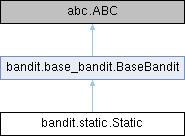This class implements a bandit with a constant reward value each time an arm is chosen. More...
Inheritance diagram for bandit.static.Static:

Public Member Functions | |
| __init__ (self, k, rewards=None) | |
| Instantiate the class. | |
| rewards (self) | |
| select (self, index) | |
| Get a reward from the chosen arm. | |
| trueValues (self) | |
| Provide a numpy array of the rewards for each arm. | |
 Public Member Functions inherited from bandit.base_bandit.BaseBandit Public Member Functions inherited from bandit.base_bandit.BaseBandit | |
| int | k (self) |
| Return the number of arms this bandit has. | |
Public Attributes | |
| k | |
Protected Attributes | |
| _rewards | |
 Protected Attributes inherited from bandit.base_bandit.BaseBandit Protected Attributes inherited from bandit.base_bandit.BaseBandit | |
| _k | |
Detailed Description
This class implements a bandit with a constant reward value each time an arm is chosen.
The reward is not drawn from a distribution, nor does it change over time. The user can specify the reward values at instantiation if they want.
Constructor & Destructor Documentation
◆ __init__()
| bandit.static.Static.__init__ | ( | self, | |
| k, | |||
rewards = None |
|||
| ) |
Instantiate the class.
If reward_values is provided, it will be used for the reward values. Otherwise, a random value on the interval [0, 1) will be chosen for each arm.
- Parameters
-
k An int greater than or equal to one representing the number of arms this bandit has. rewards If provided, the fixed reward for each arm. It can be a list, array, numpy array, or any sort of iterable object, but must have a length equal to k. It can also be None to let the bandit pick random rewards from the interval [0, 1).
Reimplemented from bandit.base_bandit.BaseBandit.
Member Function Documentation
◆ rewards()
◆ select()
| bandit.static.Static.select | ( | self, | |
| index | |||
| ) |
Get a reward from the chosen arm.
- Parameters
-
index The arm to pick. It can be any input that allows for indexing of a numpy array, including single integers or a set of integers.
- Returns
- The reward for that arm. The type will be either a single float if a single arm was chosen or an array of floats representing the rewards for each arm identified by index. If None is passed in to index, this will return None.
Reimplemented from bandit.base_bandit.BaseBandit.
◆ trueValues()
| bandit.static.Static.trueValues | ( | self | ) |
Provide a numpy array of the rewards for each arm.
- Returns
- A numpy array where each index corresponds to the reward value for the associated arm at that index.
Reimplemented from bandit.base_bandit.BaseBandit.
Member Data Documentation
◆ _rewards
◆ k
The documentation for this class was generated from the following file:
- bandit/static.py